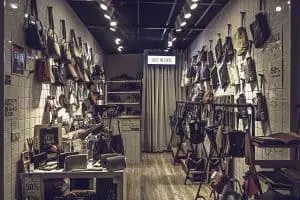Introduction
The concept of Made in Italy is something that builds its foundation in the collective imagination. Made in Italy is a concept that stretches across many product categories and industries. Some examples include.
- Fashion
- Beauty
- Eyewear
- Food and Beverage
Some other are categories are lesser-known but still extremely important.
- Yachting
- Design
- Jewelry
- Furniture
- Mechanical Engineering
The COO effect is a very important element in the value proposition of a brand. On the one hand, it allows promoting products very persuasively in foreign markets, but it also plays a very important role in domestic markets. We address COO branding in more detail in this post.
Made in Italy is a concept that is able to merge in a unique country of origin a list of attributes that spans from maintaining a strong attachment to traditions as well as being pioneering innovation.
In this post, we are going to discuss:
- What Does Made in Italy Mean?
- What Kind of Companies are Associated with Made in Italy?
- How Made in Italy is Becoming Associated with Sustainable Fashion.
- Conclusions
1. What Does Made In Italy Mean?
Technically speaking, Made in Italy relates to a specific element of the value chain: the location of production. At the same time, the value of made in Italy spills over to:
- Excellence in raw materials. The pipeline of Italian production and the way in which the fashion supply chain is organized through small and mid-sizes family-run companies allows for high-quality production, at the cost of smaller volumes.
- Manufacturing and Craftsmanship. These values express the highly skilled labor which is involved in the production of Italian goods, spanning from fashion to the automotive industry.
- Know-How. The long traditions and knowledge associated with many of the products which are made in Italy allow for additional value to be associated with the final product.
All in all, the addition of this production value translates into a 20% price markup for Italian products, sold internationally.
2. What Kind of Companies Are Associated with Made in Italy?
Additional features of the Made in Italy country of origin effect, relate to an additional aspect that has much to do with the organizational structure of Italian businesses. Italian businesses, for the most part, are small or medium enterprises (SME in short) which are owned by family members. This provides them with unique characteristics:
- Company size. As already mentioned the size of the company is usually small, allowing for more agile management on one end, but still somewhat limited opportunities for international competitiveness and growth.
- Profitability. Profitability is more associated with luxury, or quality margin, rather than with economies of volume, as production output is limited.
- The role of the CEO. The CEO is usually a member of the family. This might create conflicts of interest but overall it provides continuity in the vision of the company.
- Time orientation. The time-orientation of the company is often structured around long-term goals. By having a family-centered system, the brand is associated with the family’s legacy and dynasty.
- Business management system. The business management system revolves around a relational style of management as opposed to a rational style of management.
- Bottom line. Because of their rooting in society Italian family businesses tend to invest more cultural, social and symbolic assets by also pursuing sustainable growth. We will discuss this point in section 3 of this post.
Let’s see what relational and rational mean specifically:
- Relational. Relational management is a management approach that relies on personal dynamics, connections, acquaintances and customary habits. In a word, is qualitative management, not based on data or numbers, as much as on empathy and personal leadership.
- Rational. Rational management is based more on number-crunching and data-driven decision making. As a result, decisions are made through a reflection which is heavily based on efficiency and quantitative information.
It has to be noted, however, that Made in Italy, despite our premises is not only a synonym of product quality but also a symbol of service excellence. Many Italian brands, such as Dolce and Gabbana, have developed an international reputation for creating new standards of excellence in customer service and retail operations.
As we came to the geographic localization of these firms we can see how production clusters are mostly located in the central regions of Italy, specifically in Tuscany, Emilia Romagna, and in the Marche.
Finally, what challenges lie ahead for Italian companies? There are many which could be mentioned, as running businesses in Italy provide many unique challenges. Some of them may entail the management of companies who are walking a path in the middle between heritage and innovation, for instance:
- Industrial Innovation. Investing in creating industries that take advantage of the benefits of Industry 4.0, and automation.
- Knowledge Transfer. Understanding how to grow and expand internationally by transferring Italian know-how.
- Retail Experience. Evolving the way brands communicate with customers by creating phygital (physical and digitally integrated) experiences.
- Customer relationship. Create engaging customer relationships.
All in all, Made in Italy is a country of origin brand which entails great persuasion, but also a lot of responsibility towards the past (heritage) but also the future of fashion. In the following paragraph, we are also going to address the way in which Made in Italy is addressing the need for new environmental standards.
3. How the Made in Italy is Gaining an Association with Sustainable Fashion.
Sustainability has become a predominant element in the business of fashion, and Italian fashion producers have taken the challenge right on, creating a manifesto, or a general declaration of intent in the way in which the Made in Italy country of origin label needs to become a synonym of sustainable business.
In 2012 the Camera Nazionale Della Moda published a manifesto of sustainable fashion. These are its tenants:
- Design. Designers need to create products with sufficient quality to have an extended life and minimise the impact onto the ecosystem.
- Choice of Raw Materials. Focus the acquisition of raw materials on materials and fabrics with high social value.
- Processing of Raw Materials and Production. Reduce the environmental and social impact of the processing and production activities, also acknowledging the employees’ and workers’ contribution to the value chain.
- Distribution, Marketing, and Sales. Include sustainability criteria along the path the product reaches your customer.
- Management systems. Commit to the continuous improvement of company performance.
At 440 Industries we are very concerned with the efforts that brands need to undergo to become agents of sustainable change. In this section of the website, we have a wide variety of resources for anyone interested in understanding how to become more environmentally-aware.
4. Conclusions
In this post, we defined what Made in Italy means and what are some of the most relevant features that relate to the Made in Italy philosophy. Working with Italian manufacturers is a great opportunity and sometimes a privilege, which has to be approached with both business and cultural understanding of the way in which Italian businesses operate.
In our blog, you will find more information about the fashion business and the importance of cultural understanding when crossing national borders. If you wish to expand on this topic, here a post you might be interested in: The Challenges of Negotiating Across Borders.







